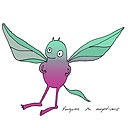 Even the greatest child development thinkers can be wrong a time or two. In the 1960s, Swiss Child psychologist Jean Piaget and Dr. Spock thought imaginary friends to be a bad thing. Even today some parents worry when an extra plate and empty chair appears at the dinner table.
Even the greatest child development thinkers can be wrong a time or two. In the 1960s, Swiss Child psychologist Jean Piaget and Dr. Spock thought imaginary friends to be a bad thing. Even today some parents worry when an extra plate and empty chair appears at the dinner table.But a new study in Developmental Psychology says not to worry. School-age children who had imaginary friends had a more developed “theory of the mind,” or the understanding that others have thoughts and feelings, too.
“Imaginary friends, often associated with introverted or disturbed children, are an integral part of social development, giving young ones an outlet for difficult feelings or confusion," according to the May 25 article in the San Jose Mercury News.
Still, if a Kindermusik parent in your class is concerned about a child’s new pretend play-pal, experts in the San Jose article say there are a few things a parent can watch for when it comes to healthy relationships with imaginary friends:
- Most imaginary friends stick around for a year.
- They often appear most notably between the stages of imaginative play and language development (the study notes that 6- and 7-year-olds were just as likely to have imaginary friends as 3- and 4-year-olds).
- Make sure that fantasy is not interfering with normal life.
- The imaginary friend should be under the child’s control—not encouraging bad behavior in the child.
No comments:
Post a Comment